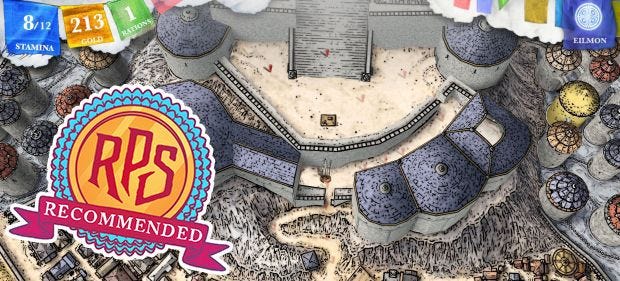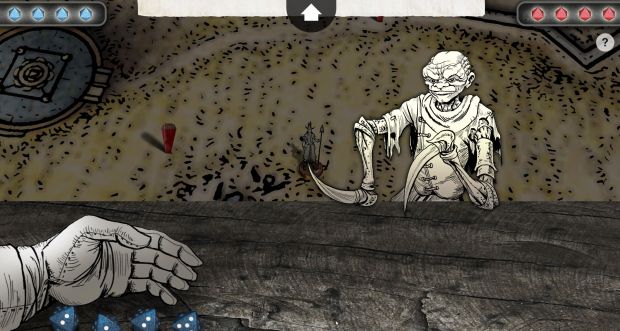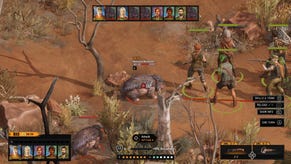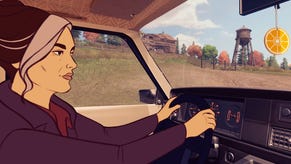Wot I Think: Sorcery! Part 4
Crowning Glory
With Part 4, Inkle’s triumphant Sorcery! series [official site] reaches its conclusion. It's still sourcing its core tale from the Steve Jackson classics, but having taken wonderful leaps away to include its own far more elaborate possibilities. And the trajectory of each game being better than the last is not broken in this fourth release, the best yet, and indeed one I now feel comfortable calling one of the finest RPGs ever made. This is spectacular. Here's wot I think:
Each part of this interpretation of Jackson’s seminal choose-your-own-adventure series has been broader and more involved than the last, and each has followed on directly, carrying over the incalculable choices you’ve previously made and tailoring itself to them. Which is to say, while you could begin Part 4 with a new character and a pre-determined past, the tale of the Analandar bravely exploring outside of her/his home village to reach the fabled city of Mampang, to prevent the evil Archmage from destroying the world with the Crown Of Kings, it’d be a daft thing to do.
My memory isn’t what it used to thingy, and with the constant rush of games flowing past my eyes I really do struggle to remember the intricacies of individual plots. Which is often great, meaning I can go back to things from the past and enjoy them all over again (with the slight caveat of my brain remembering absolutely crucial details at the worst possible moments in order to induce the worst spoilers possible). It’s also a little unsettling when returning to an ongoing series after a five month gap to realise that to properly follow it I need to recall a whole smattering of minutiae across three previous games.
The good news is, the game makes a good effort to remind me of the broad strokes. As the Sorcery! series has gone on, Inkle have stepped further from the source material and into even more eloquent and elaborate games. By Part 3 it had entirely shed its linear page-turning simulator, and managed to replicate the same sensation of choosing one’s own adventure while more freely able to move around the world - and indeed across two overlapping time periods in the same world. As such, the implications of a player’s individual choices at an increasing number of moments need to be more keenly felt as the series progresses.
So thankfully it reminds me of the equipment I’d gathered in Part 3, the loss of my little finger, and my inept failure to prevent one of the seven serpents from reaching the evil Archmage to warn him of my arrival. (I think there was an opportunity earlier in the game to slaughter that seventh, that I missed, and so chose to live with the consequences.) It gets a bit more complicated when I try to remember what I said to one now-recurring character of three long-forgotten given choices, or who was the innocent I’m told by the precis that I killed. That doesn’t sound like me! How did I forget doing that?
It continues to look beautiful, the three-dimensional maps on which you play looking like they should be printed on a tea-towel (this is a very complimentary remark, anyone under 35). The game feels just as solid and neatly presented as before, the text scrolling from top to bottom in torn notes, the writing exemplary. It also continues to have the absolutely dreadful spell-casting interface, that works nicely on phones and is a buggy broken mess on PC. That’s a bit inexcusable by a fourth chapter, and it remains just as irritating as the letters spin erratically and select incorrectly. The inventory screen is also just as abysmal, a colossal mess of bad layout and presentation. The core hasn't changed, while what they do with it has.
The game is best understood by describing an innocuous moment (although I’d stress that if you're new here and this convinces you, please please start with Part 1 - all four are fantastic games, and it’d be such a fantastic shame to start playing in the last chapter of the story):
So, right near the start it’s nighttime, you’re cold and hungry, and there are three caves. From the web of listed choices you have a really remarkable amount of freedom. You could keep walking into the night (very dangerous), sleep rough outside the caves, look more closely at the caves, or delve into your spellbook to see if there’s something useful to do in there. Any action that doesn’t require moving somewhere new is unlikely to end your turn (although there are surprises), so I took a closer look at the caves, learned that one was large enough for a fire but also hidden beasties, one very small, and a third with hoofprints leading into it. It then let me opt to take a closer look at the prints, which revealed they were a few days old - none coming back out. Intriguing. So in I went, where I found the dead body of a goatman - something that would have implications (dependent upon directions taken later on) for me further into my journey.
I cast a HOW spell, that gives information of safe passage, and I’m informed this cave should present no dangers, and after burying the body, that’s where I spend the night. Or I could have squeezed into the smaller cave and discovered a far more cosy safe space inhabited only by a loud-mouthed beastie, or the larger cave and gotten myself into a fight with a furious creature. Fighting uses the game’s smart alternative to dice rolling, where you attempt to predict the enemy’s potential attack move and counter accordingly.
Each of the choices in that single section has its own implications and consequences, no matter how seemingly inconsequential. Which cave you sleep in doesn’t determine the rest of the game, but it flavours it, along with every other choice you make along the way. And that's just a moment on a quiet walk.
The memory issues do pick at the experience, though. One night I’m sleeping rough due to a recent Birdman attack and a need to recover some stamina, and I find myself meeting Flanker again. Who’s Flanker? I’ve entirely forgotten. Fortunately the conversation I have reminds me he’s an assassin, and then it comes back to me, but not before I could have chosen to peg it. However, at the same time, this is a character I could have killed in - I think - Part 2, so that he’s recurring now is unique to my choices many months ago.
Of course, how you approach a situation needn’t be set in stone. The games have the digital equivalent of leaving dozens of fingers and thumbs in the pages of the choose-your-own-adventure, letting you rewind to any previous moment in your adventure. You lose all the progress after that point, but you can replay a situation as often as you like. This is a feature that is there for you to ignore or exploit to the level with which you feel comfortable. For me, I’ve settled on a compromised position, where I’ll happily replay a scene to see if there was a more narratively interesting resolution (which also means perhaps a more lucrative result too), but will not use it to undo significant events that change the path of my tale. For instance, I’m happy to see if a different dialogue choice might give me a more interesting and satisfying conversation, but I won’t undo a moment that sees me captured or taken away from my intended path. Your choices will likely be different. And, well, the game’s not ignoring this.
The theme at this point is clearly something of a spoiler if you’ve not played any of the previous three chapters, but can still safely be described as the entire run’s original premise: attempting to enter Mampang to defeat the evil Archmage. You’re just an awful lot closer now. And gosh, I’m so impressed at the enormous variety of ways it’s possible to finally enter the dreadful citadel, from subterfuge, combat, disguises, spells, sneaking, bare-faced lying, and the method I used: making a really nasty smell.
The big twist here is that once you’ve gone through the city gates, the ability to rewind your progress is gone. You can take things back to before you cross the threshold at any point, but once inside you’re stuck with your actions. A twist that’s just about justified narratively, and of course adds a big spin on how you’ll approach any situation.
The game also picks up many of the threads you might have thought dropped in previous games, as well as adapting magnificently to your previous choices. I’ve no idea how the game might play had I succeeded in killing all seven serpents in Part 3, but with one that got away, the Archmage knows I’m coming. I’m extremely intrigued to replay all four games, this time just to find out how different a fourth game I could have. (And yes, I’d be steeled for some disappointment, as these things rarely extend beyond cosmetic in such games.) There is a lovely moment that acknowledges something you might have wondered about in Part 2, more of the mysterious ZEd spell you’ll have heard rumour of, and little nods to the previous games in the series throughout.
Then there are the completely barmy moments, like when I accidentally cast a spell that caused me to be surrounded by fifty cats that I then couldn’t get rid of, or the time I found myself genuinely considering chopping off my own hand to get out of a predicament involving strange glyphs and being stuck on the ceiling.
As you might imagine, having the ability to rewind taken away has a dramatic effect on how you play. Up until this point I had studiously ensured I never got wet, even throughout all of Part 3’s extensive swamps, and I’d ensured it by taking advantage of my ability to reverse decisions. Or cheated, perhaps. So yeah, all my papers, half my rations, ruined by falling in a swamp. Gah. And how brilliant, how supremely smart of this game to have noticed exactly how people have been playing the previous games, and then to respond to this not by a brute force mechanical device (although that’s essentially how it’s done) but by a narrative device that proves more interesting for the player, rather than frustrating. They’ve taken a power away, and made things feel better for it: that’s a rare skill.
You can still die, and you can still carry on, but I’ve already said too much. It all works splendidly, but for a little too much repetition being required at certain points.
Sorcery! Part 4 is, all things considered, utterly fantastic. It’s a superb culmination to the series, embodying the best aspects of all three previous games. It is elaborate and complex and multifarious, far longer than the first two games, but without the feeling of too much looseness that impinged on the third. It’s so fascinating to explore, so rewarding when you take the longer route, and constantly out-thinking you, playing with and preying on expectations developed by decades of RPG questing.
It is, in fact, far more sophisticated in its presentation of moral situations than any other RPG out there. Where I’ve been hard-coded by a lifetime of BioWare to assume being noble and virtuous will be sacrificially beneficial, the Sorcery series cunningly takes advantage of this and cruelly responds. Because such faux-nobility is often vanity or self-serving, and this is a game that responds appropriately to that. You can unquestioningly help every gnarled beggar in the pretence that you just want to be kind, more truthfully expecting useful reward, but here you’re just as likely to be robbed or murdered for your naivety. Attempting to second-guess the game almost always works in your average RPG - here the game third-guesses you right back, and lets you know it’s no one’s fool. It’s too easy to take that for granted within the simplicity of its text-based presentation, but goodness me, it’s exemplary in its class.
There are choices right up until the final moments that have big impacts, as indeed are there events that only occur because of choices you made episodes ago. Having finished it after spending many, many hours exploring every nook and cranny of this final city, there are so many things I want to go back and do differently to see what differences it would make. As indeed do I want to start the whole series again, play very differently, perhaps be a horrid person this time, and see a whole other side of it.
Sorcery! has been spectacular, each episode better than the last, and the fourth a towering triumph. It has been such an intelligent combination of trusting a quality source material, while being bold enough to take enormous steps away to innovate and explore even better ideas and possibilities. Everyone who cares about RPGs needs to take a look to see how much more they should be expecting from their genre, and to have a really bloody good time.
Sorcery! Part Four is out later today, for Windows and Mac, and is available through Steam.
















